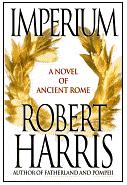This was the part I liked:
Steve Inskeep: There are so many comparisons over so many years between modern times & the Roman Empire. Does it get hard, after a while, when you’re researching this to just focus on what really happened then, without contaminating it with the present?
Robert Harris: I think that that’s a perfectly fair criticism, but on the other hand, I think it’s impossible to look back at the past and to free oneself from the circumstances in which one is writing. It seems to me, looking back at the Roman Republic, that any generation will take a different thing from it. History is what we bring to it, not just the events themselves but how we interpret those events...
That last sentence is what got to me. It's perfect.
My Mom and I have had a lot of discussions about the Bible and what it "says"... I usually argue that the Bible was written by men in their time, then translated by men in their time, and so on... and it can't help but be affected by that circumstance.
I've also had conversations with Joyce about historical events. Joyce loves history... the History channel, the Discovery channel, historical novels, non-fiction books on historical events... so do I, but probably not as much as Joycie. We've had many conversations about historical events like slavery and prejudice, about WWII, etc. Yes, monsters exist, but for some people, the time they lived and what they did in that time was affected by their history and the interpretation of the history before they lived. How do you explain to a child why some people made young children work in sweatshops and beat them? How people walking down the street there knew about those sweatshops. Why did those things happen. Why do those things still happen. How to explain to your young daughter why women were considered like possessions, why women couldn't own property or inherit, why women used to not be able to vote for our president? Stuff that seems outrageous to us now, wasn't always so outrageous. Wrong, yes. Of course. That's why things have changed, and will keep changing.
How could people do what they did and be ok with it is a difficult thing for us, now, to understand because of what we bring to those historical events, not just what happened, but how we view and feel about those events.
Thank goodness.
Mr. Harris, you're a wise man... so I bought your book this weekend.


No comments:
Post a Comment